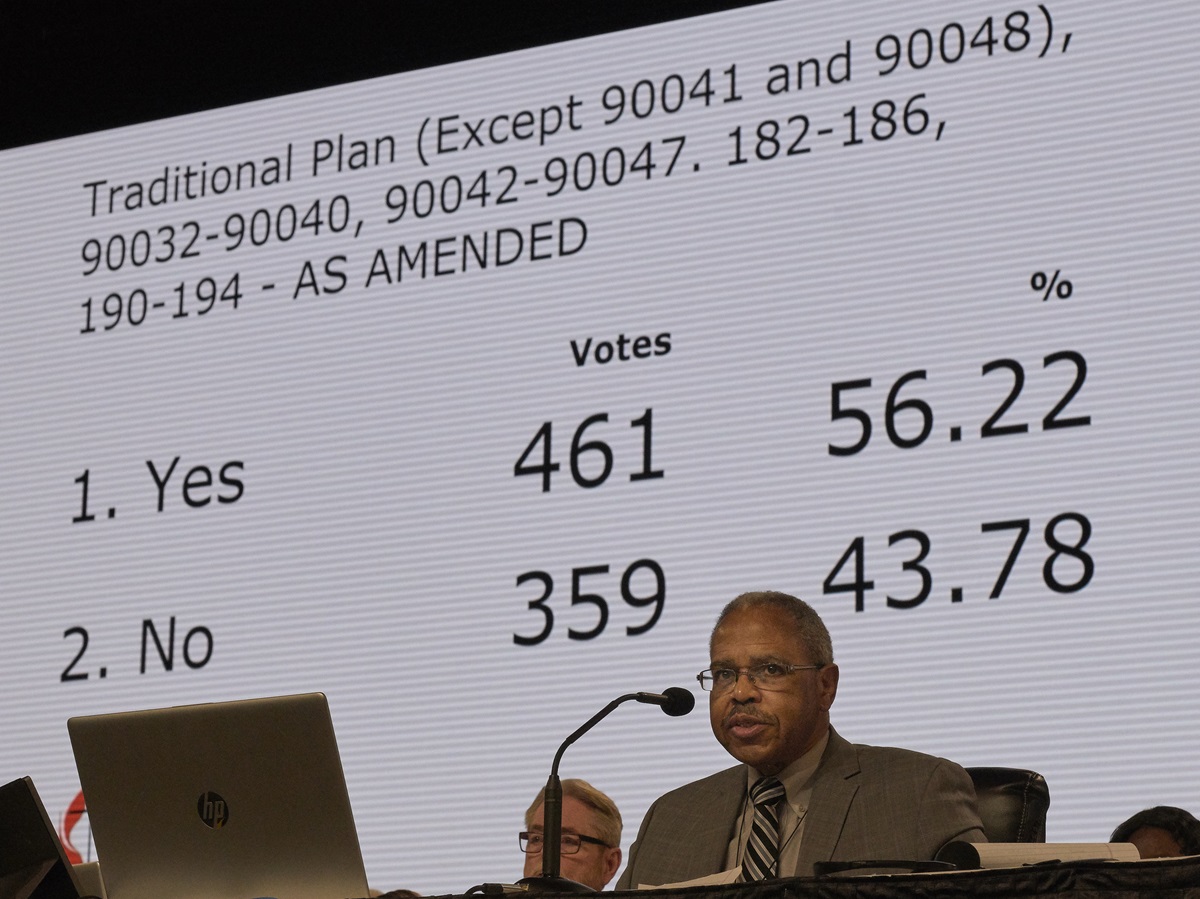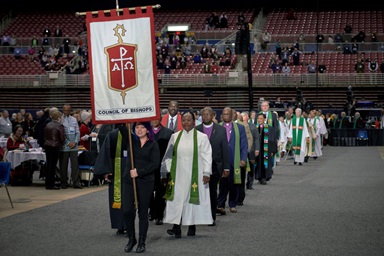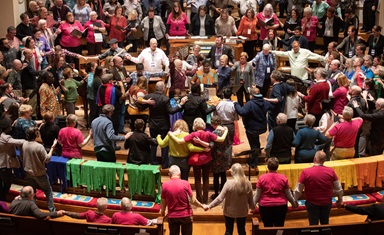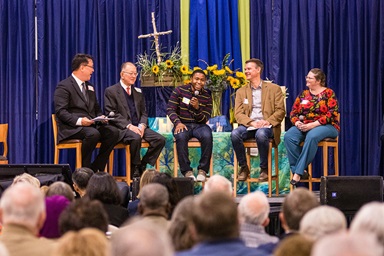After approving the Traditional Plan in the morning, General Conference delegates spent the afternoon debating and ultimately voting against the One Church Plan and the Simple Plan.
Delegates opposed the bishops’ recommended One Church Plan by a vote of 436 to 386. The vote was 53 to almost 47 percent.
Delegates also voted against moving forward with the Simple Plan, submitted by the unofficial United Methodist Queer Clergy Caucus, by a vote of 494 to 323.
Dorothee Benz, delegate from New York, made an amendment to pull the Simple Plan from a motion to reject all remaining petitions.
The Rev. Adam Hamilton, a delegate from Great Plains, stood to speak for the motion, saying not at least discussing the plan would inflict harm.
“Yes, it’s going to be defeated, that’s clear. But this is the one opportunity to say we care enough to listen for a moment.”
Fred Sayeh, Liberia, argued that the Simple Plan should not be singled out for “special treatment.”
“Every plan had an opportunity. At this point it’s clear delegates are finding a way forward,” he said.
The Rev. Markus Jung, Germany South, said he had a dream that on Feb. 27, The United Methodist Church will be a church that is “colorful, diverse, full of love.”
The Rev. Rebecca Girrell, New England Conference, said the time has passed “to say simply if you can’t say something nice, don’t say anything at all. I know we are not yet ready to say something nice and may never be. John Wesley said, ‘Do not harm, do good, grow in the love of God.”
The votes mean the Traditional Plan is the only plan guaranteed to go to plenary Feb. 26.
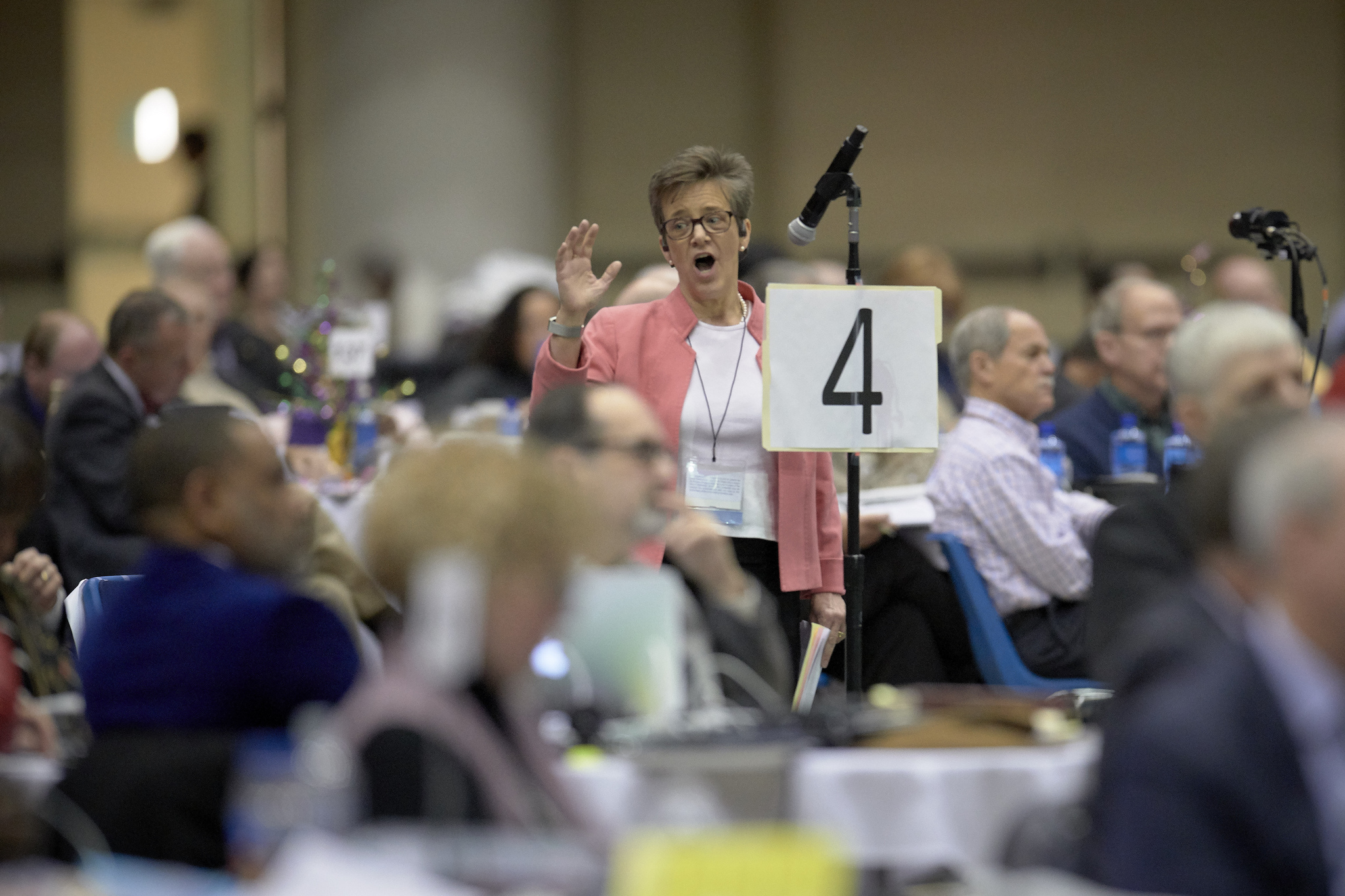
Also heading to the plenary are two separate petitions that, with certain limitations, would allow churches to depart with their property. Currently, delegates also plan to discuss the LGBTQ-submitted Simple Plan, which eliminates restrictions related to homosexuality.
The votes are a good indication of what direction delegates hope to take The United Methodist Church in its longtime debate over homosexuality.
The Traditional Plan aims to strengthen the denomination’s prohibitions against clergy officiating at same-sex unions or being “self-avowed practicing homosexuals.” The plan also encourages those who will not obey church prohibitions to find another church home.
The One Church Plan would have left questions of such weddings up to individual clergy and congregations — and questions of gay ordination up to individual conferences. Central conferences — church regions in Africa, Europe and the Philippines — would be able to determine their own policies.
Since the 1972 General Conference, The United Methodist Church has asserted all people are of sacred worth but “the practice of homosexuality is incompatible with Christian teaching.”
More restrictions were added by subsequent gatherings of the international denomination’s top lawmaking assembly.
In recent years, as homosexuality gained more public acceptance in the United States and other parts of the church, a number of United Methodists — including whole conferences — have publicly defied these rules.
The 2016 General Conference, after rumors of a church split over homosexuality reached a fever pitch, authorized the Council of Bishops to form a commission to find a way forward.
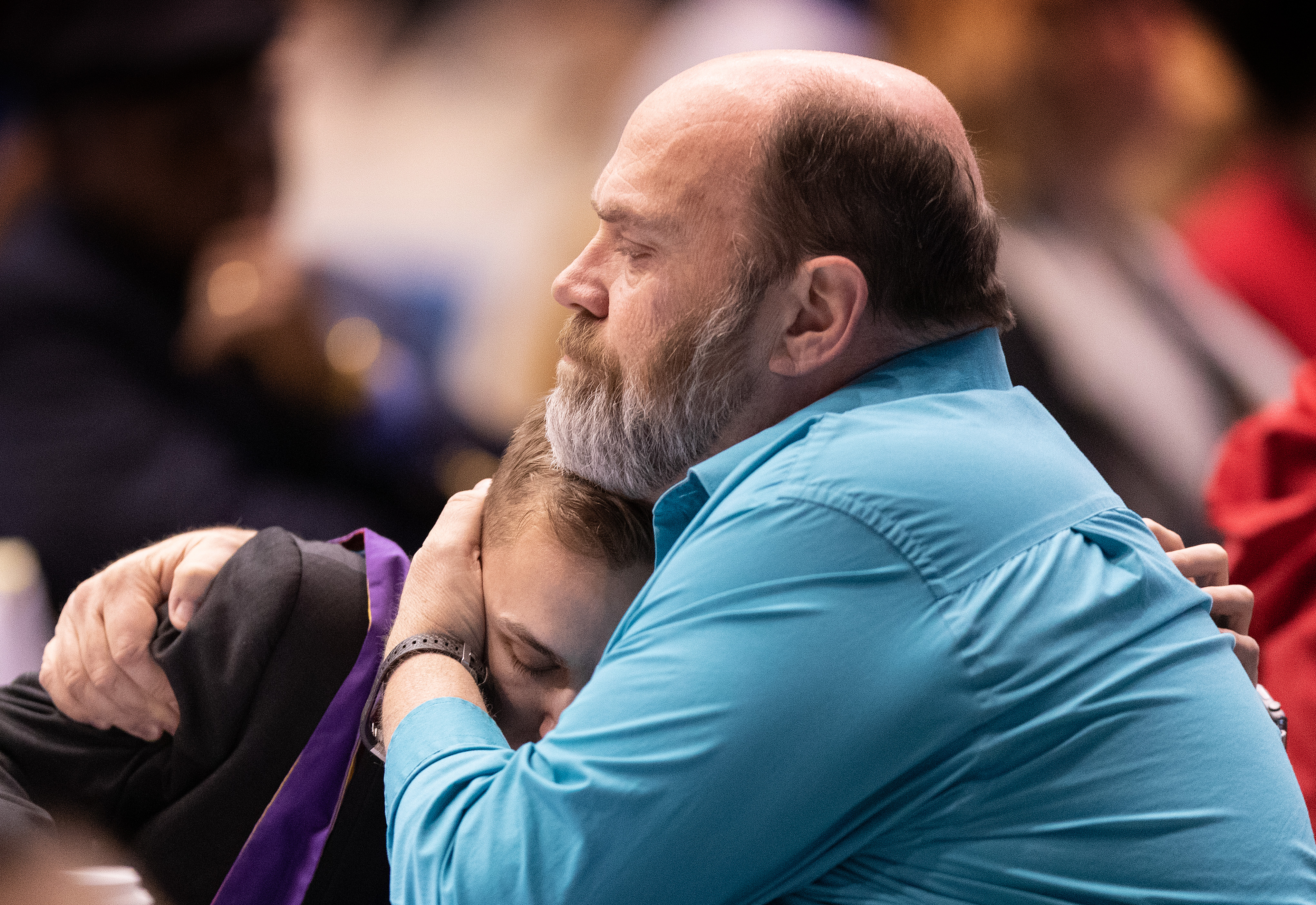
The One Church Plan, in particular, inspired impassioned debate during the day’s proceedings.
Defenders described the plan as a way to keep together an ethnically and theologically diverse denomination that has a number of LGBTQ members.
The Rev. Patricia Farris of the California Pacific Conference, speaking in favor of the plan, urged delegates: “Let’s not do anything here to diminish our church or its mission.”
Opponents accused the One Church Plan of dramatically changing the denomination’s connectional form of governance and violating Scripture.
“It is better to be divided by truth than united in error,” said Rudolph Merab, the lead lay delegate from the Liberia Conference. He added that the plan would not provide salvation.
Much of the morning’s debate about the Traditional Plan dealt with not so much advocacy for the plan as much as efforts to address constitutional problems raised by the Judicial Council, the denomination’s top court.
Last year, bishops referred the Commission on a Way Forward’s report to the council. That report contained the One Church, Traditional and Connectional Conference plans.
The court identified problems in three sentences of the One Church Plan and in multiple petitions in the Traditional Plan. It did not take up the Connectional Conference Plan, which also did not gain committee approval on Feb. 25.
The Rev. Maxie Dunnam of the Kentucky Conference brought legislation meant to address the constitutional issues in the Traditional Plan, but the body did not have the detailed legislation in writing. That amended legislation can return as a minority report.
Efforts to amend the One Church Plan to bring it in line with the Judicial Council ruling also hit a snag. The first motion to delete one of the unconstitutional sentences tied 409 to 409, meaning it failed.
The other two changes passed but only narrowly.
Later in the afternoon, delegates voted to send the legislation they had approved Feb. 25 — the Traditional Plan and the two disaffiliation petitions — to the Judicial Council for review.
The Judicial Council agreed to rule on a request by the GC2019 legislative committee to review the “constitutionality, meaning, application or effect” of the plans approved during its Feb. 24 business sessions.
The court set a deadline of 9:30 p.m. to receive opening briefs and 10:30 p.m. to receive reply briefs.
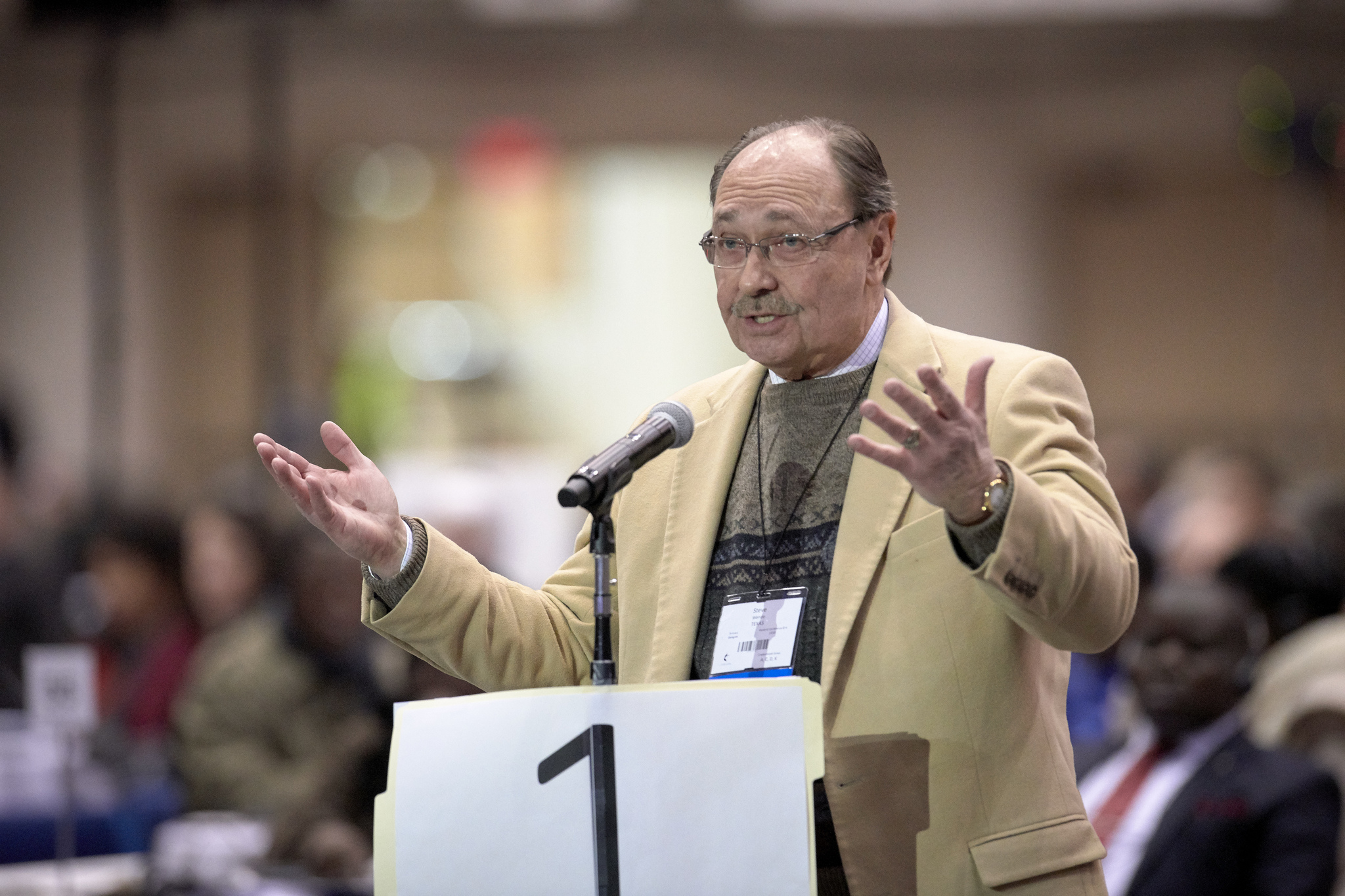
Updated at 5 p.m. Monday
After approving the Traditional Plan in the morning, General Conference delegates spent the afternoon debating and ultimately voting against the One Church Plan.
Delegates opposed the bishops’ recommended One Church Plan by a vote of 436 to 386. The vote was 53 to almost 47 percent.
The votes mean the Traditional Plan moves forward to plenary Feb. 26.
Also heading to the plenary are two separate petitions that, with certain limitations, would allow churches to depart with their property. Currently, delegates also plan to discuss the LGBTQ-submitted Simple Plan, which eliminates restrictions related to homosexuality.
Dorothee Benz, delegate from New York, made an amendment to pull the Simple Plan from a motion to reject all remaining petitions.
The Rev. Adam Hamilton, a delegate from Great Plains, stood to speak for the motion, saying it would inflict harm by not at least discussing the plan.
“Yes, it’s going to be defeated, that’s clear. But this the one opportunity to say we care enough to listen for a moment.”
The votes are a good indication of what direction delegates hope to take The United Methodist Church in its longtime debate over homosexuality.
The Traditional Plan aims to strengthen the denomination’s prohibitions against clergy officiating at same-sex unions or being “self-avowed practicing homosexuals.”
The plan also encourages those who will not obey church prohibitions to find another church home.
The One Church Plan would have left questions of such weddings up to individual clergy and congregations — and questions of gay ordination up to individual conferences. Central conferences — church regions in Africa, Europe and the Philippines — would be able to determine their own policies.
Since the 1972 General Conference, The United Methodist Church has asserted all people are of sacred worth but “the practice of homosexuality is incompatible with Christian teaching.”
More restrictions were added by subsequent gatherings of the international denomination’s top lawmaking assembly.
In recent years, as homosexuality gained more public acceptance in the United States and other parts of the church, a number of United Methodists — including whole conferences — have publicly defied these rules.
The 2016 General Conference, after rumors of a church split over homosexuality reached a fever pitch, authorized the Council of Bishops to form a commission to find a way forward.
Both the One Church and Traditional plans emerged from that commission’s work.
The One Church Plan, in particular, inspired impassioned debate during the day’s proceedings.
Defenders described the plan as a way to keep together an ethnically and theologically diverse denomination that has a number of LGBTQ members.
The Rev. Patricia Farris of the California Pacific Conference, speaking in favor of the plan, urged delegates: “Let’s not do anything here to diminish our church or its mission.”
Opponents accused the One Church Plan of dramatically changing the denomination’s connectional form of governance and violating Scripture.
“It is better to be divided by truth than united in error,” said Rudolph Merab, the lead lay delegate from the Liberia Conference. He added that the plan would not provide salvation.
Much of the morning’s debate about the Traditional Plan dealt with not so much advocacy for the plan as much as efforts to address constitutional problems raised by the Judicial Council, the denomination’s the top court.
Last year, bishops referred the Commission on a Way Forward’s report to the council. That report contained the One Church, Traditional and Connectional Conference plans.
The court identified problems in three sentences of the One Church Plan and in multiple petitions in the Traditional Plan. It did not take up the Connectional Conference Plan, which also did not gain committee approval on Feb. 25.
The Rev. Maxie Dunnam of the Kentucky Conference brought legislation meant to address the constitutional issues in the Traditional Plan, but the body did not have the detailed legislation in writing. That amended legislation can return as a minority report.
Efforts to amend the One Church Plan to bring it in line with the Judicial Council ruling also hit a snag. The first motion to delete one of the unconstitutional sentences tied 409 to 409, meaning it failed.
The other two changes passed but only narrowly.
Updated at noon, Monday
The Traditional Plan — with some amendments — won approval in the General Conference legislative committee, clearing a major hurdle in The United Methodist Church’s top lawmaking body.
The delegates also approved two plans that allow churches, with certain limitations, to leave the denomination with their property.
All the forwarded legislation still faces a vote in the General Conference plenary session on Feb. 26.
The legislative committee voted for the Traditional Plan, which seeks to strengthen enforcement of the denomination’s homosexuality prohibitions, as amended by 461 to 359.
Delegates approved amending two of the plan’s 15 petitions with the aim of addressing constitutional problems that the Judicial Council, the denomination’s top court, identified last year. The court had identified violations of the denomination’s constitution in multiple petitions.
The denomination currently bans clergy from officiating at same-sex weddings or being “self-avowed practicing homosexuals.” But a number of United Methodists have publicly defied those prohibitions in recent years.
The Rev. Maxie Dunnam, a delegate from the Kentucky Conference, started the debate on the plan by saying he had been trying to distribute a 30-page packet explaining modifications to the plan to address these problems.
The Rev. Gary Graves, secretary of the General Conference, said he had not received that packet.
Debate followed over whether it was too late to distribute materials.
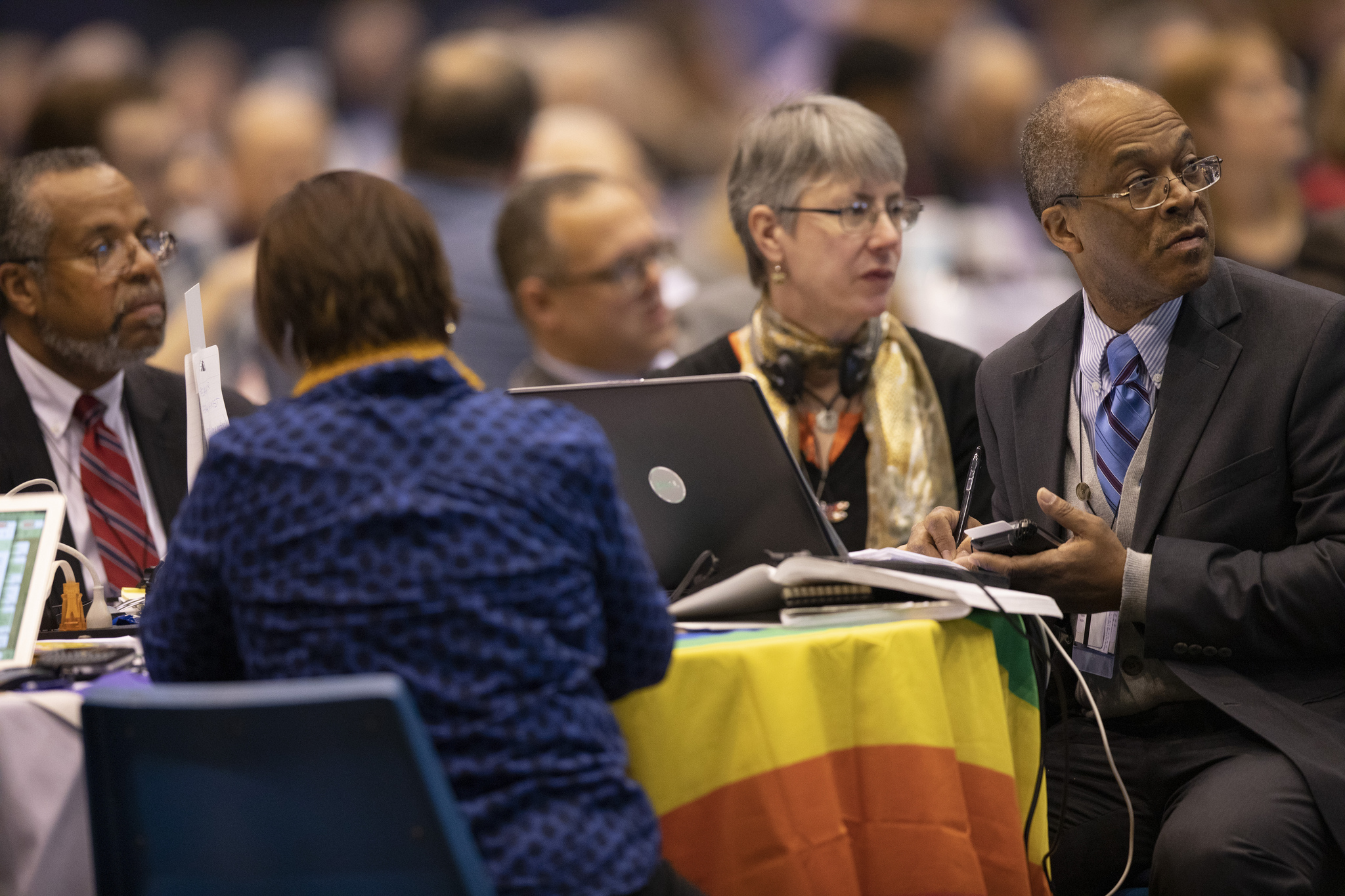
Throughout the morning debate, a number of delegates raised concerns that the Traditional Plan’s constitutional problems were unfixable.
Jill Wondel, a delegate from the Missouri Conference, said too many fixes were needed for the time available. She also spoke against the plan, saying it did not address the main issues before the body.
“The question we are asking is: Does this plan unite us or not?” she said. “We are not voting on whether homosexuality is a sin or not. We are not voting yes or no if the Bible is true.”
The Rev. Ricky Harrison, associate pastor of First United Methodist Church in Decatur, Texas, and a young adult observer in St. Louis, described the General Conference’s direction as “frustrating and demoralizing.”
The majority of bishops recommended the One Church Plan, which allows more freedom on matters of marriage and ordination.
“I think it’s disheartening for folks in the pews back home,” he added. “The Traditional Plan is extremely alienating even for moderate folks.”
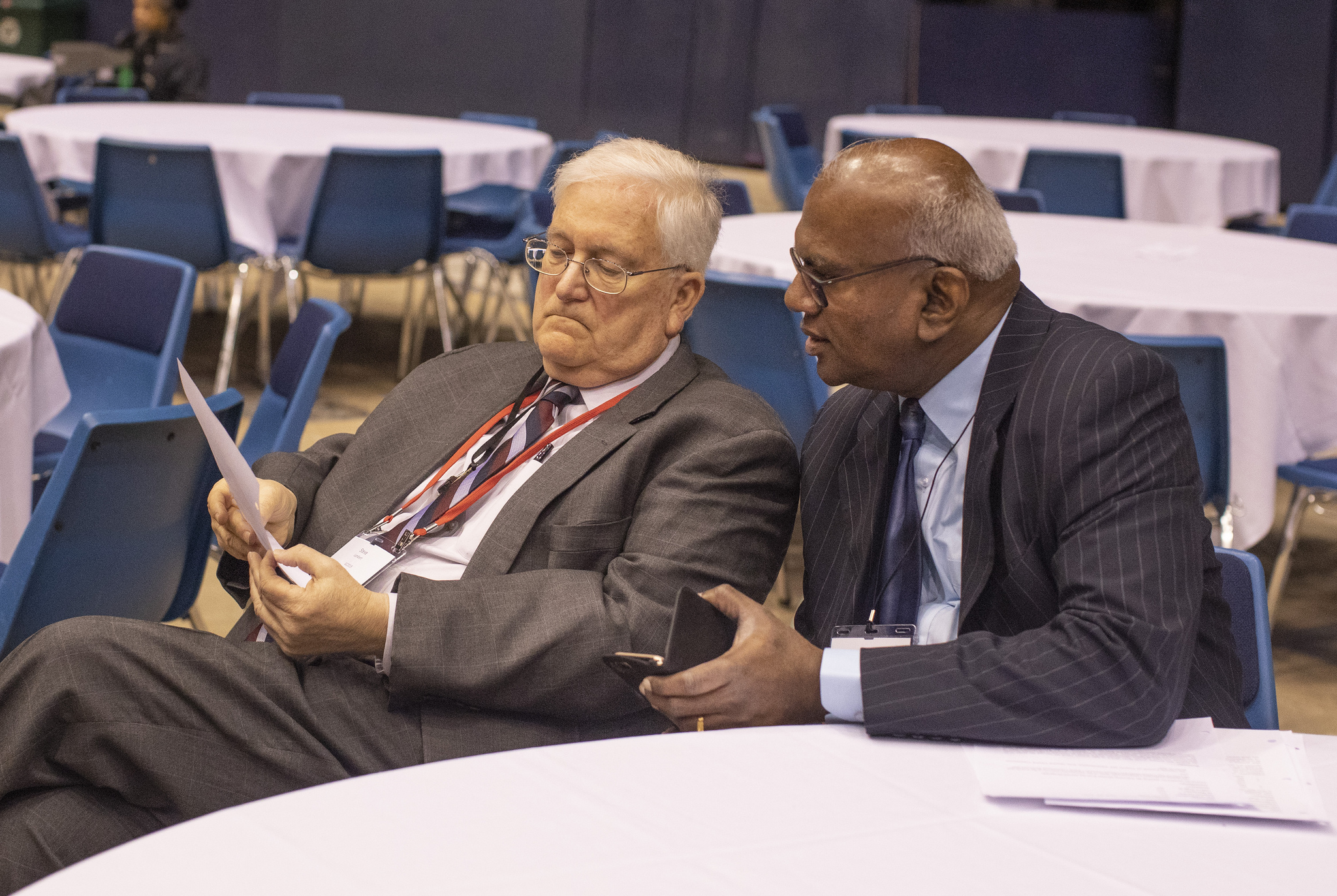
Updated at 9:30 a.m. Monday
General Conference delegates, early in their legislative debate, defeated an effort to postpone discussion of the Traditional Plan and potentially bring up the One Church Plan.
By 488 to 334, delegates voted against postponing the discussion. The move essentially adds to the challenges of the One Church Plan to get a hearing.
The Rev. David Livingston, a delegate from Great Plains Conference who was wearing a red One Church Plan button, made the motion to postpone.
“Two-thirds of U.S. delegates have refused the Traditional Plan,” he said in speaking to the motion. He added that his children frequently don’t hear the love part of Christ’s message, but only the judgment part.
“We can’t let that happen because of a legislative process that doesn’t allow us to talk about it.”
Fred Sayeh, delegate from the Liberia Conference, spoke against the motion, pointing to the General Conference delegates’ votes Feb. 24 to prioritize the Traditional Plan in the discussion. He encouraged all delegates to vote against the motion.
The Rev. Rebekah Miles, an Arkansas Conference delegate, used her support of postponement to discuss why she opposes the Traditional Plan.
“There is a wonderful saying in Zambia when a baby pees in your lap, you don’t cut off your legs,” she said.
She then argued that the Traditional Plan cuts off church leaders’ legs. She also noted that parts of the plan as submitted were already ruled unconstitutional by the denomination’s top court.
The Rev. Joe Harris, the elected chair of the legislative committee, then fielded questions of whether the motion was in order in the first place.
After consulting on parliamentary procedure, Harris reiterated that it was.
The Rev. Stephen Wende, a delegate from the Texas Conference, also spoke against the motion.
“Most of us thought the spirit shared among the delegates was awfully positive,” he said. Most, he added, thought the voting went fairly well.
“Let’s not start by trying to torpedo Christian conferencing.”
After delegates opted not to postpone, they got into discussions of the multiple petitions in the Traditional Plan.
Gilbert and Hahn are multimedia news reporters for United Methodist News Service. UMNS reporters Sam Hodges and Joey Butler contributed to this report. Contact them at (615) 742-5470 or newsdesk@umcom.org. To read more United Methodist news, subscribe to the free Daily or Weekly Digests.
Like what you're reading? Support the ministry of UM News! Your support ensures the latest denominational news, dynamic stories and informative articles will continue to connect our global community. Make a tax-deductible donation at ResourceUMC.org/GiveUMCom.

